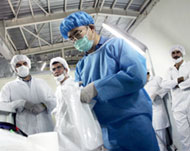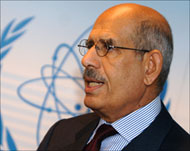UN nuclear agency meets on Iran
The UN nuclear watchdog has held a crisis meeting to try to stop Iran pursuing a nuclear programme after Tehran resumed work at a uranium plant, stoking Western fears the government was bent on developing atomic weapons.

As the governors of the International Atomic Energy Agency (IAEA) met in Vienna on Tuesday, Iran’s new president, Mahmoud Ahmadinejad, said he had new ideas to resolve the nuclear standoff with the West and was ready to continue talks with the EU.
“I have new initiatives and proposals which I will present after my government takes office,” he said to UN Secretary-General Kofi Annan, the semi-official ISNA students news agency reported.
US President George Bush welcomed the statement as a positive sign, but said he remained deeply suspicious that Tehran was intent on developing an atomic weapon.
Terms of talks
Iran’s chief delegate at the IAEA meeting, Sirus Naseri, said after the IAEA session adjourned that Iran wanted to continue talks with France, Britain and Germany but only on terms satisfactory to Tehran.
“We no longer accept being left out in the cold to wait for the Europeans to come up with a plausible basis for a solution,” he said, adding an Iranian proposal to settle the standoff by increasing IAEA inspections was still on the table.
 |
|
Iran restarted work on Monday |
“We can negotiate with the Europeans on the basis of that proposal,” he said, adding Iran would continue to resume some of the nuclear activities it had suspended under a November 2004 agreement with the EU.
Ahmadinejad told Annan an EU offer of incentives if Tehran scrapped its uranium enrichment programme was an insult to the Iranian nation. Tehran rejected the offer on Monday.
“They have talked to us … as if the Iranian nation was suffering from backwardness and the time was 100 years ago and our country was their colony,” he said.
He said Iran, which says it is seeking only nuclear power, had done nothing unlawful by resuming uranium conversion at a nuclear facility near the central city of Isfahan on Monday.
Removing seals
Another senior Iranian delegate to the Vienna meeting said UN seals were to be removed at Isfahan that could allow it to take the work a step further.
Mohammad Saeedi, deputy head of Iran’s Atomic Energy Organisation, said IAEA inspectors surveying developments at the plant would unseal a mothballed section by Wednesday.
“The agency has promised us it will remove the seals by noon (0730 GMT) on Wednesday because the installation of cameras has been completed,” he said.
 |
|
IAEA Director General Mohamed |
On Monday, Iran resumed work at a less sensitive part of the plant that had not been sealed, ending an agreed moratorium.
It had mothballed some nuclear activities under the November deal with the European Union’s three biggest powers.
Restarting the work, Tehran defied EU warnings it could now be referred to the UN Security Council for possible sanctions for having hidden its nuclear work for years, though the IAEA looked unlikely to take such a step at the Vienna meeting.
Iran’s secrecy breached the nuclear Non-Proliferation Treaty (NPT) which aims to thwart the spread of nuclear arms.
“I would hope that this is simply a hiccup in the process and not a permanent rupture,” IAEA director general Mohamed ElBaradei said of the EU-Iran talks.
He called on Iran to continue talks with the Europeans and said it must suspend its nuclear fuel programme to build confidence that its nuclear ambitions were entirely peaceful.
ElBaradei said the board would probably need one or two days to decide how to act.
Russia calls for halt
Iran’s nuclear ally Russia, which is building a nuclear power plant at Bushehr in Iran, called on Tehran to immediately resume the suspension.
“It would be a wise decision to immediately stop the resumed work on uranium conversion and continue close cooperation with the IAEA to remove all remaining questions relating to the Iranian nuclear programme,” the Foreign Ministry said.
Bush said the United States would work with Britain, France and Germany, the so-called EU3, on what steps might be in order if talks failed to reach an agreement.
Going to the United Nations to seek possible international sanctions against Iran remained an option, he said.
“It is important for the Iranians to understand that America stands squarely with the EU3, that we feel strongly the Iranians need to adhere to the agreements made in the Paris accord and that we will be willing to work with our partners and deal with appropriate consequences should they ignore the demand,” he told reporters in Texas.
The West could call for sanctions on the grounds that Iran illegally hid its uranium enrichment programme.
The EU3 hopes to persuade all the developing countries on the IAEA’s 35-member board meeting to back an IAEA resolution urging Iran to resume the suspension of uranium conversion activities.
But some developing countries oppose such a resolution and EU diplomats said it would not be easy to get them to back it.